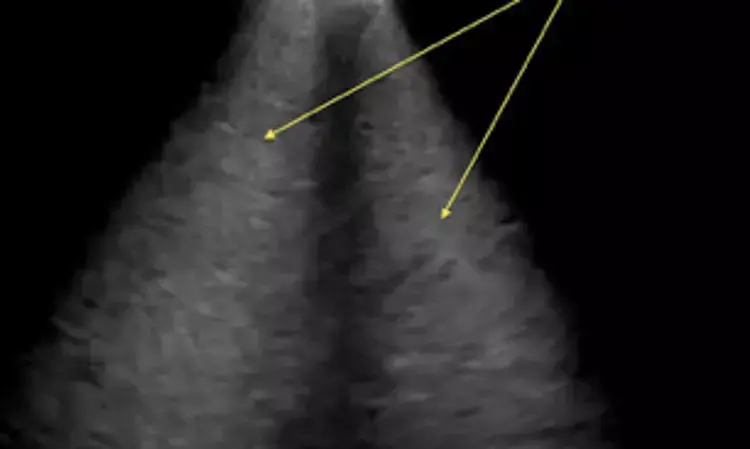- Home
- Medical news & Guidelines
- Anesthesiology
- Cardiology and CTVS
- Critical Care
- Dentistry
- Dermatology
- Diabetes and Endocrinology
- ENT
- Gastroenterology
- Medicine
- Nephrology
- Neurology
- Obstretics-Gynaecology
- Oncology
- Ophthalmology
- Orthopaedics
- Pediatrics-Neonatology
- Psychiatry
- Pulmonology
- Radiology
- Surgery
- Urology
- Laboratory Medicine
- Diet
- Nursing
- Paramedical
- Physiotherapy
- Health news
- Fact Check
- Bone Health Fact Check
- Brain Health Fact Check
- Cancer Related Fact Check
- Child Care Fact Check
- Dental and oral health fact check
- Diabetes and metabolic health fact check
- Diet and Nutrition Fact Check
- Eye and ENT Care Fact Check
- Fitness fact check
- Gut health fact check
- Heart health fact check
- Kidney health fact check
- Medical education fact check
- Men's health fact check
- Respiratory fact check
- Skin and hair care fact check
- Vaccine and Immunization fact check
- Women's health fact check
- AYUSH
- State News
- Andaman and Nicobar Islands
- Andhra Pradesh
- Arunachal Pradesh
- Assam
- Bihar
- Chandigarh
- Chattisgarh
- Dadra and Nagar Haveli
- Daman and Diu
- Delhi
- Goa
- Gujarat
- Haryana
- Himachal Pradesh
- Jammu & Kashmir
- Jharkhand
- Karnataka
- Kerala
- Ladakh
- Lakshadweep
- Madhya Pradesh
- Maharashtra
- Manipur
- Meghalaya
- Mizoram
- Nagaland
- Odisha
- Puducherry
- Punjab
- Rajasthan
- Sikkim
- Tamil Nadu
- Telangana
- Tripura
- Uttar Pradesh
- Uttrakhand
- West Bengal
- Medical Education
- Industry
Lung Ultrasound helps achieve faster resolution of congestion in acute heart failure

Acute heart failure (AHF) is known to be associated with poor in-hospital and post discharge outcomes. Although no initial management strategy improves outcome in such patients, initial goal of care is to address pulmonary congestion. Measurement of lung B lines by ultrasound provides semi quantitative assessment of pulmonary congestion but the response of these B lines to diuretic therapy is not well described in the literature.
Peter S. Pang et.al, conducted a randomized controlled, single-blind trial to determine if a 6-h lung ultrasound (LUS)-guided management improves pulmonary congestion over usual management guided solely by clinical reassessment in emergency setting. A secondary goal was to explore whether early targeted intervention leads to improved outcomes
This study was conducted across 4 centers in United States and included adult patients, with a history of HF, shortness of breath, and having at least one sign or radiographic evidence of AHF. Patients were required to have >15 B-lines in both hemithoraces on imaging. A total of 130 patients were randomized in 1:1 fashion.
The total number of B lines per patient at 6 hours was similar in both the groups. No differences were observed between treatment arms regarding length of hospital stay or days alive and out of hospital (DAOOH) at 30 days. A significantly greater reduction in the number of B-lines was observed in the LUS- guided arm than in the usual care arm during the first 48 hours, suggesting that LUS-guided patients had faster resolution of congestion. By the time of discharge, this difference in B-line reduction between the 2 arms was no longer significant.
Although protocol-driven treatment stopped at 6 h, repeat dosing during this interval was more common in the LUS-guided arm. This suggests that protocol-driven therapy might facilitate a more rapid reduction in congestion. Persistence of B-lines pre-discharge identifies patients at higher risk for worse outcomes.
Authors concluded saying that targeting pulmonary congestion with LUS did not show any significant decrease in pulmonary congestion within 6 hours compared with usual standard care. However, a consistent numeric reduction in pulmonary congestion, as measured by B-lines, in the intervention group was observed during hospitalization, suggesting that future work targeting B-line reduction throughout hospitalization is warranted.
Source:JACC heart failure journal
MBBS, M. D. Respiratory Medicine
Dr Sravan Kumar V, completed his M. B. B. S from SRMC, Nandyal and M. D. in Respiratory Medicine from the JSS Medical College, Mysore. After completing MD. he worked as Senior resident in Kasturba Hospital, Manipal. He is actively involved in various research activities of the department. Currently he is working as senior resident in Mallareddy medical college for women, Hyderabad. He can be contacted at editorial@medicaldialogues.in.
Dr Kamal Kant Kohli-MBBS, DTCD- a chest specialist with more than 30 years of practice and a flair for writing clinical articles, Dr Kamal Kant Kohli joined Medical Dialogues as a Chief Editor of Medical News. Besides writing articles, as an editor, he proofreads and verifies all the medical content published on Medical Dialogues including those coming from journals, studies,medical conferences,guidelines etc. Email: drkohli@medicaldialogues.in. Contact no. 011-43720751


